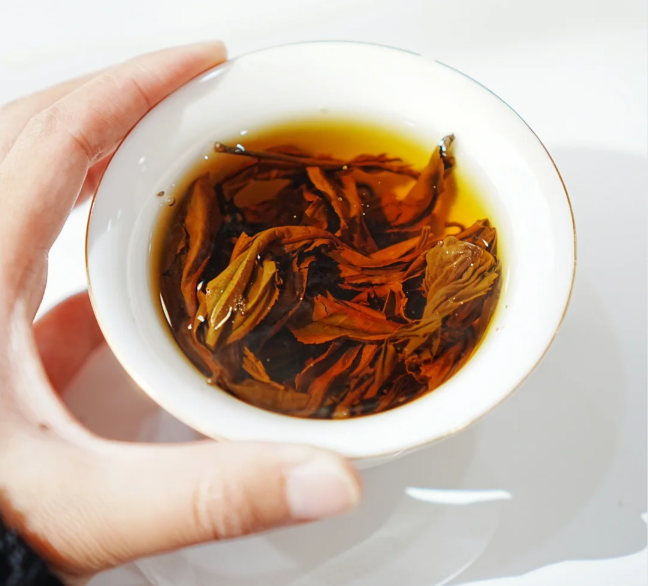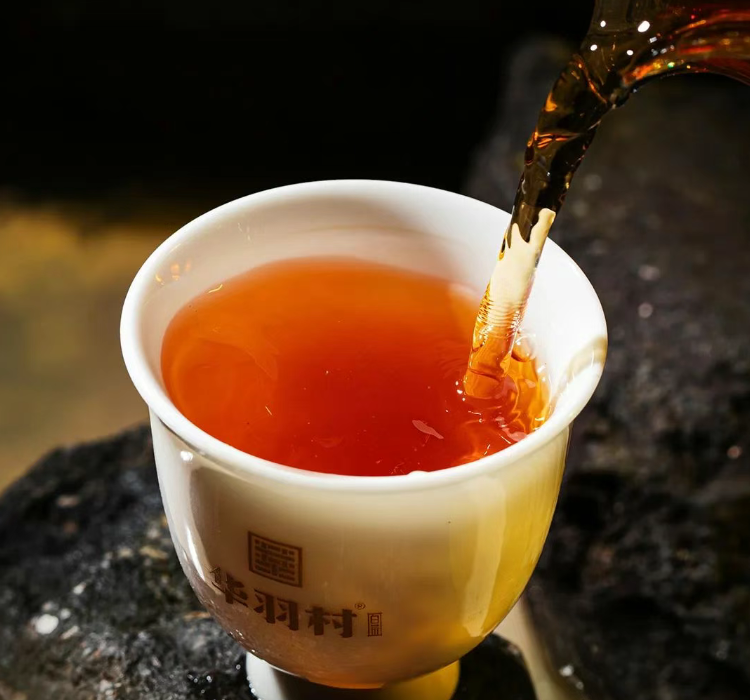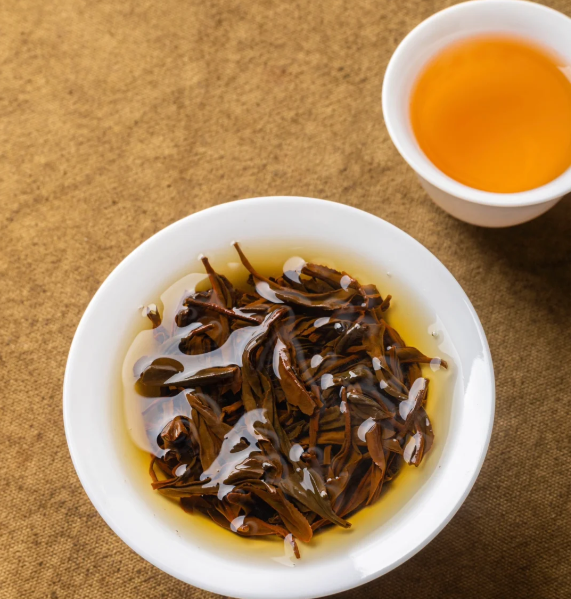Tea is a precious gift from nature to the human palate.
As one of the most consumed types of tea in the world, black tea has swept from the East to the West, thanks to its fiery red color and sweet, mellow flavor.
Known as the "Home of Black Tea," Yingde is located in the northern mountainous region of Guangdong Province. The Yingde black tea produced here is renowned for its exquisite craftsmanship and reputation, characterized by its symmetrical and beautiful appearance, dark red luster, bright red soup color, and rich, mellow aroma, making it one of China's famous tea varieties.
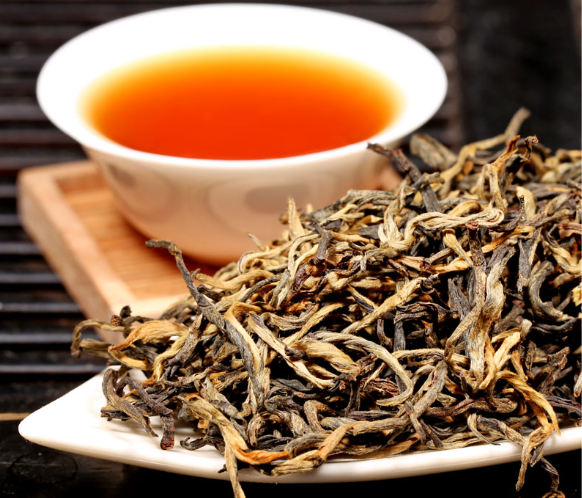
The "Eastern Golden Beauty" that broke through the borders
"Lingnan produces Fuzhou, Quanzhou, Shaozhou, Xiangzhou... often obtained, its taste is excellent." More than 1200 years ago, the tea sage Lu Yu recorded the production of tea in Yingde in his book "The Classic of Tea," where Shaozhou refers to present-day Yingde, Qujiang, and other areas.
Yingde City is located in the northern part of Guangdong Province, in the middle reaches of the Beijiang River, between approximately 23° to 25° north latitude. Due to its warm and rainy climate year-round, long frost-free period, and natural soil primarily consisting of red clay, red soil, and yellow soil, the land is fertile and slightly acidic, making it suitable for tea tree growth.
Huang Hualin, director of the Tea Technology Promotion Service Department of the Guangdong Academy of Agricultural Sciences, introduced that the development of Yingde black tea mainly has two stages: one is the development stage of black broken tea mainly for export, and the other is the development stage of Gongfu black tea mainly for the domestic market.
From the mid-1950s to 1991, Yingde black broken tea was exported overseas, known for its heavy and solid particles, brown luster, fresh and sharp aroma, bright red soup color, and strong, fresh flavor, selling to more than 70 countries and regions, and was favored by overseas markets, earning the nickname "Eastern Golden Beauty."
Finished Yingde black tea. Xinhua News Agency reporter Hu Nayan photographed.
In 1963, Yingde black tea was praised at the tea auction market in London, England, stating that Yingde black tea has excellent color, aroma, and taste, comparable to Ceylon black tea. After the news spread, Yingde black tea became famous worldwide, with demand exceeding supply. From 1964 to 1991 alone, Yingde black tea exported a total of more than 27,300 tons, generating a total foreign exchange of 44.59 million US dollars.
Today, Yingde black tea has gradually developed from the black broken tea stage to the Gongfu tea stage, mainly featuring the strip-shaped "Yinghong No. 9" black tea, which is slightly curled with golden tips, has a rich and lasting aroma, bright red soup color, and a rich, sweet flavor.
The passing down of intangible cultural heritage skills
In a tea garden in Yinghong Town, Yingde City, 85-year-old Chinese black tea master Yuan Xuepei is bending over the lush green tea bushes, carefully observing the growth of the tea leaves, and occasionally reminding his apprentice Qiu Shaomin beside him: "The tenderness, freshness, uniformity, and cleanliness of the tea leaves are key; scientific water and fertilizer management must be done well."
Yuan Xuepei is one of the founders of Yingde black tea. More than half a century ago, he participated in the research of processing technology and craftsmanship of Yingde black tea. In the practice of tea production, he created and established more than 30 tea research models, and the high-yield tea garden project he participated in once set a world record for tea garden yield of 1410 jin per mu.
Yuan Xuepei introduced that the production of Yingde black tea is divided into two main processes: primary processing and fine processing. Primary processing mainly includes withering, rolling, fermentation, and drying, with strict standards for moisture, temperature, and humidity at each step. The fine processing stage mainly includes 16 processes such as initial shaking, screening, bagging, rough shaking, air selection, shaking screen, hand picking, replenishing fire, blending, and boxing. The tenderness and freshness of the tea leaves directly determine the appearance and taste of Yingde black tea.
Tea leaves undergoing withering, which refers to the process of dissipating moisture from the tea leaves before fixation. Xinhua News Agency reporter Ouyang Jianjia photographed.
From planting tea, nurturing tea to making tea, Yuan Xuepei has spent most of his life dealing with tea. He has extremely strict and detailed standards for the entire process of tea production. "The quality of a tea variety is mainly judged by its quality rather than quantity. Only with meticulous preliminary work can the tea have good quality," Yuan Xuepei said.
As a representative inheritor of Yingde black tea production skills, Yuan Xuepei actively passes on his skills to others. He has trained more than ten apprentices, actively helping them overcome technical difficulties and improve tea quality.
Qiu Shaomin, a "post-80s" apprentice, is one of Yuan Xuepei's proud students. Growing up playing in the tea garden, his experience has given him a deep affection for tea. In 2013, Qiu Shaomin apprenticed under Yuan Xuepei to learn tea-making skills, and tea has become his lifelong pursuit.
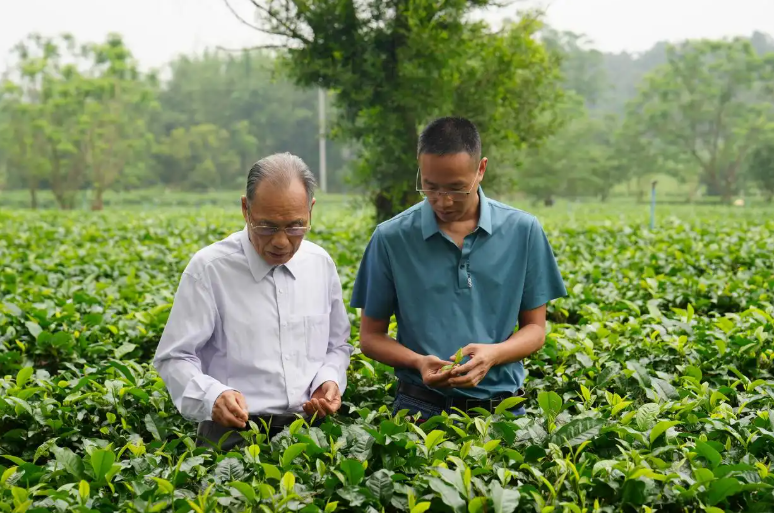
Yuan Xuepei (left) and apprentice Qiu Shaomin discuss the growth of tea leaves. Xinhua News Agency reporter Ouyang Jianjia photographed.
In the process of researching black tea skills, Qiu Shaomin believes that making tea should retain the unique flavor of Yingde black tea recognized by the older generation of tea masters while continuously improving the taste and freshness of the tea. Under the guidance of his master Yuan Xuepei, Qiu Shaomin has conducted various innovative explorations, developing new varieties of black tea on one hand and continuously trying new sales models on the other.
Seeing his apprentices enthusiastically engaged in the development of the tea industry, Yuan Xuepei said: "I have spent my life in tea, accompanied by tea, and take pride in tea. I hope the new generation of tea masters can learn the skills earnestly, and while mastering the techniques, they can also better promote the development of the Yingde black tea industry."
The "Green Engine" of Rural Revitalization
Every year in April and May, it is the season for picking spring tea. In the tea gardens of Yingde City, tea farmers are busy picking fresh leaves in preparation for the spring tea market.
Diao Kaiwu is a "post-90s" new farmer from Hujing Village in Yinghong Town. He not only grows and nurtures tea himself but also contracts over 80 acres of tea gardens, builds production workshops, establishes a company, and creates his own tea brand.
“Post-90s” new farmer Diao Kaiwu is picking tea in the tea garden. Xinhua News Agency reporter Ouyang Jianjia photographed.
In the tea production workshop, technical staff only need to set the parameters, and machines can replace hands to complete withering, rolling, fermentation, and drying processes, achieving automation in the entire black tea processing process. Yingde City currently has 9 regional tea processing service centers, with an average single batch processing capacity of 15,000 jin per service center. To unify the taste quality of Yingde black tea, Yingde City has also established a processing technology engineering center for digital precision control and standardized, automated production of Yingde black tea. Currently, there are 8 automated production lines in operation in Yingde City, with an annual processing capacity of over 20,000 tons of tea.
During market research on tea, Diao Kaiwu learned that young people have a unique preference for fruit tea and flower tea beverages. He developed a flower tea variety that combines jasmine and Yingde black tea. "Because I am a young person, and people around me love tea beverages, I wanted to try it out. I will also develop new milk tea varieties in the future to gradually open up the market for tea among young people," Diao Kaiwu said.
In addition, Diao Kaiwu has also explored an economic model of "tea industry + tourism + research study," developing high-quality tea tourism routes, establishing tea picking experience parks, and related venues for tea culture research and study, contributing to the development and inheritance of tea culture.
As of the end of 2022, Yingde City has a tea garden area of 175,000 acres, with an annual dry tea output of 14,000 tons and a comprehensive tea output value of 6 billion yuan. Currently, there are 550 tea enterprises in the city, driving 150,000 employees.
"Yingde City will focus on achieving a target of 10 billion yuan in output value for Yingde black tea by 2025, with important measures such as expanding scale, improving quality, extending chains, expanding markets, and strengthening brands, adhering to industrialization, marketization, diversification, and rule of law to promote the high-quality development of the Yingde tea industry, realizing rural revitalization through industrial revitalization," said Fan Zhibin, deputy mayor of Yingde City.
General Planning: Zhao Danping, Gu Qianjiang
Planning: Wei Tiemin
Supervision: Min Jie
Reporters: Hu Nayan, Gou Hongjing, Ouyang Jianjia
Editor: Zhu Haochen
Xinhua News Agency Foreign Affairs Department
Xinhua News Agency Guangdong Branch
Co-produced
Produced by China Story Workshop
